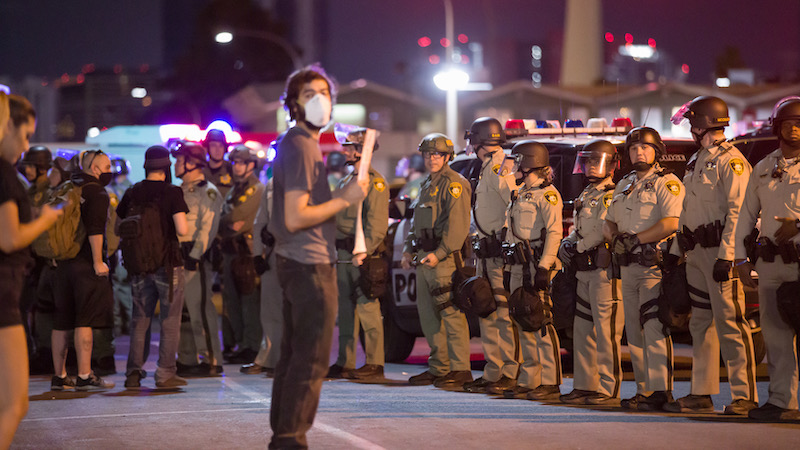Minimum wage is supposed to help poor people. That’s why two out of three Americans support raising it to $10 an hour. And that’s probably why President Obama, during his State of the Union Address last Tuesday, called for raising it by more than 20 percent.
But as any logician knows, public support for an idea doesn’t make it true.
Minimum wage has always had public support. When the first federal minimum wage legislation—the Fair Labor Standards Act—was passed in 1938, it was thought to be a major victory for the working class. The idea of protecting workers from the profit-motives of their employers was thought to be humane. But the slightest bit of economic investigation tells a more complex story.
 Cartoon by Henry Payne
Wages are the price for labor. They are the compensation workers require for their time and efforts. As with any price, regulatory controls—whether a price ceiling or a price floor—distort the market, creating either a shortage or a surplus. If the price of milk is capped at $1 per gallon, grocers will soon run out, as customers buy more than they need while prices are low. If the price of bread is not allowed to fall below $10 per loaf, grocers won’t be able to sell their stock as consumers will wait until prices drop to buy bread.
In the same way, minimum wage—a price floor on labor—creates a surplus of workers. At a price of $7.25 per hour, workers who are willing to sell their labor outnumber business-owners willing to hire them. There is only so much money to go around, and—like the grocery store’s customers—businesses cannot spend more on wages than they earn in revenue. And of course, not every type of labor is the same—some jobs simply aren’t worth paying someone $7.25 an hour to complete.
The result: Fewer jobs and permanent unemployment for those unable to produce more than $7.25 worth of goods for their employers. Hardly a means to help the working class.
Now in real terms, $7.25 an hour is a low wage. In fact, workers earning minimum wage today earn less than those did in the 1950s—before the age of quantitative easing and rapid monetary inflation. But that doesn’t make a minimum wage hike any more justifiable.
Despite the good intentions of its modern-day propagators, minimum wage is a questionable policy that should raise eyebrows for anyone concerned with the plight of the poor. At the very least, think twice before supporting a minimum wage hike. History suggests it might not have Mr. Obama’s intended effect.
Cartoon by Henry Payne
Wages are the price for labor. They are the compensation workers require for their time and efforts. As with any price, regulatory controls—whether a price ceiling or a price floor—distort the market, creating either a shortage or a surplus. If the price of milk is capped at $1 per gallon, grocers will soon run out, as customers buy more than they need while prices are low. If the price of bread is not allowed to fall below $10 per loaf, grocers won’t be able to sell their stock as consumers will wait until prices drop to buy bread.
In the same way, minimum wage—a price floor on labor—creates a surplus of workers. At a price of $7.25 per hour, workers who are willing to sell their labor outnumber business-owners willing to hire them. There is only so much money to go around, and—like the grocery store’s customers—businesses cannot spend more on wages than they earn in revenue. And of course, not every type of labor is the same—some jobs simply aren’t worth paying someone $7.25 an hour to complete.
The result: Fewer jobs and permanent unemployment for those unable to produce more than $7.25 worth of goods for their employers. Hardly a means to help the working class.
Now in real terms, $7.25 an hour is a low wage. In fact, workers earning minimum wage today earn less than those did in the 1950s—before the age of quantitative easing and rapid monetary inflation. But that doesn’t make a minimum wage hike any more justifiable.
Despite the good intentions of its modern-day propagators, minimum wage is a questionable policy that should raise eyebrows for anyone concerned with the plight of the poor. At the very least, think twice before supporting a minimum wage hike. History suggests it might not have Mr. Obama’s intended effect.
 Cartoon by Henry Payne
Wages are the price for labor. They are the compensation workers require for their time and efforts. As with any price, regulatory controls—whether a price ceiling or a price floor—distort the market, creating either a shortage or a surplus. If the price of milk is capped at $1 per gallon, grocers will soon run out, as customers buy more than they need while prices are low. If the price of bread is not allowed to fall below $10 per loaf, grocers won’t be able to sell their stock as consumers will wait until prices drop to buy bread.
In the same way, minimum wage—a price floor on labor—creates a surplus of workers. At a price of $7.25 per hour, workers who are willing to sell their labor outnumber business-owners willing to hire them. There is only so much money to go around, and—like the grocery store’s customers—businesses cannot spend more on wages than they earn in revenue. And of course, not every type of labor is the same—some jobs simply aren’t worth paying someone $7.25 an hour to complete.
The result: Fewer jobs and permanent unemployment for those unable to produce more than $7.25 worth of goods for their employers. Hardly a means to help the working class.
Now in real terms, $7.25 an hour is a low wage. In fact, workers earning minimum wage today earn less than those did in the 1950s—before the age of quantitative easing and rapid monetary inflation. But that doesn’t make a minimum wage hike any more justifiable.
Despite the good intentions of its modern-day propagators, minimum wage is a questionable policy that should raise eyebrows for anyone concerned with the plight of the poor. At the very least, think twice before supporting a minimum wage hike. History suggests it might not have Mr. Obama’s intended effect.
Cartoon by Henry Payne
Wages are the price for labor. They are the compensation workers require for their time and efforts. As with any price, regulatory controls—whether a price ceiling or a price floor—distort the market, creating either a shortage or a surplus. If the price of milk is capped at $1 per gallon, grocers will soon run out, as customers buy more than they need while prices are low. If the price of bread is not allowed to fall below $10 per loaf, grocers won’t be able to sell their stock as consumers will wait until prices drop to buy bread.
In the same way, minimum wage—a price floor on labor—creates a surplus of workers. At a price of $7.25 per hour, workers who are willing to sell their labor outnumber business-owners willing to hire them. There is only so much money to go around, and—like the grocery store’s customers—businesses cannot spend more on wages than they earn in revenue. And of course, not every type of labor is the same—some jobs simply aren’t worth paying someone $7.25 an hour to complete.
The result: Fewer jobs and permanent unemployment for those unable to produce more than $7.25 worth of goods for their employers. Hardly a means to help the working class.
Now in real terms, $7.25 an hour is a low wage. In fact, workers earning minimum wage today earn less than those did in the 1950s—before the age of quantitative easing and rapid monetary inflation. But that doesn’t make a minimum wage hike any more justifiable.
Despite the good intentions of its modern-day propagators, minimum wage is a questionable policy that should raise eyebrows for anyone concerned with the plight of the poor. At the very least, think twice before supporting a minimum wage hike. History suggests it might not have Mr. Obama’s intended effect.



